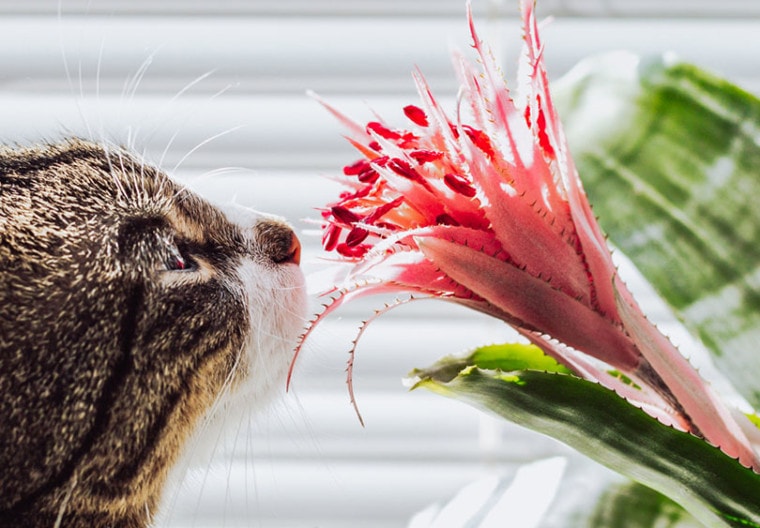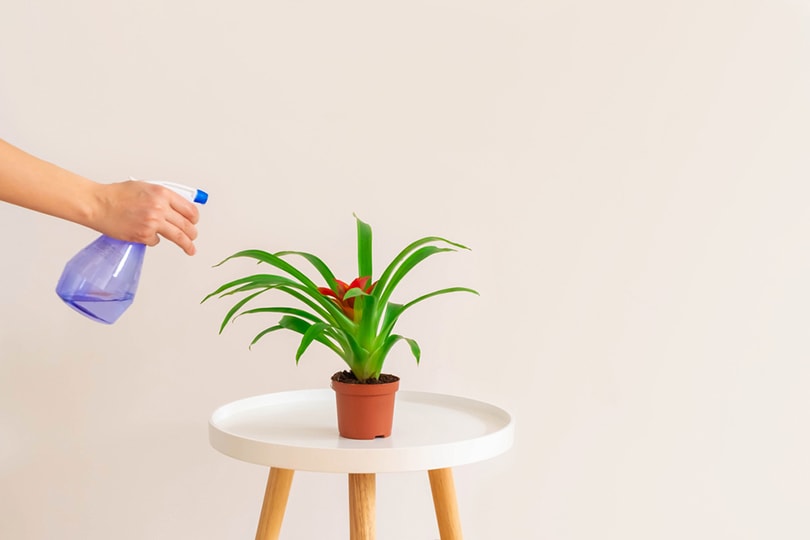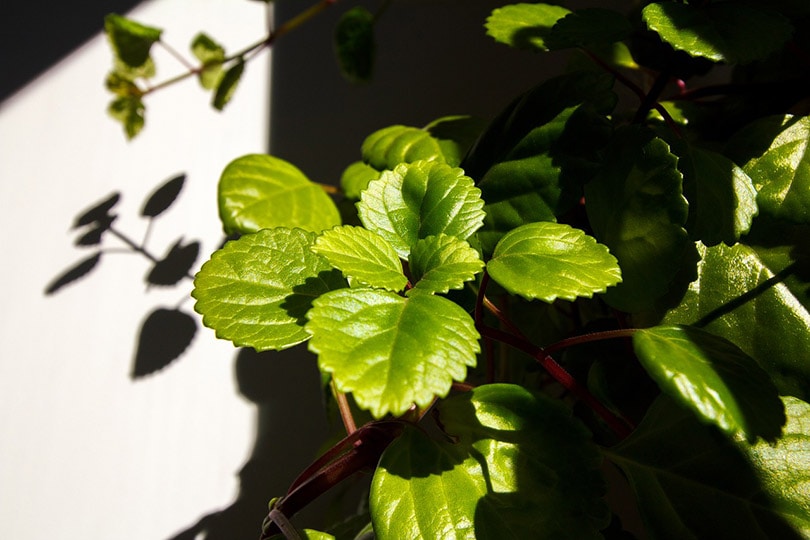
No. Bromeliad plants are non-toxic to cats. All the different houseplants in the Bromeliaceae family are harmless to cats and even dogs. Cat owners can breathe a sigh of relief since their furry friends sometimes graze on houseplants or grass. However, despite the plant being non-toxic to cats and other pets, you must be careful to prevent your kittens from spending too much time around the plants.
Kittens usually tend to chew bromeliad leaves, and though not poisonous, it can make them sick since the plant material can’t be digested and is not part of their normal diet.
How to Protect Your Bromeliads From Your Cats
Depending on your cat’s habits, you may need to take an active role in protecting your bromeliads from your cats for the best interest of your plant and its growth. Besides your kitten chewing the plants and getting sick, other challenges may come from growing and breeding.
Your bromeliad pot might be at risk with your pet around since cats like to hop around, thus knocking things over. In addition, the pet digging through the pot may, in the process, uproot the roots of the bromeliad, causing the plant to die.
Here are some tips that can help you protect your bromeliad plants from your pets:

The 5 Houseplants That Are Safe and Non-Toxic for Cats
Like humans, cats seem to enjoy the sights and scents of flora. Cats’ love for nature may often include chewing plants or using them as an occasional alternative to the litter box. Luckily, there are several common houseplants, succulents, or greenery that cats can live with peacefully.
They include:
1. Spider Plants

Spider plants (Anthericum comosum), also known as Chlorophytum, thrive easily indoors, adapt well to the vases you put them in, and survive with little sunlight. They come in various varieties, all of which are non-poisonous to cats and need little care to keep them alive. Their spider-like leaves, sprouting from a central root in the ground, attract some feline friends to explore, eat or chew them. However, if that is a problem, try hanging them out of reach of your kitty.
2. African Violets

African violets (Saintpaulia species) are more demanding in terms of sunlight and water than spider plants, but they come in a range of attractive flower colors. Although African violets are non-poisonous to cats, you want to keep them away from your kitty since they are usually grown in tiny pots that curious felines can easily knock over. To help avoid a mess, find a larger, heavier pot and increase the bottom weight to prevent your kitty from spreading soil into your carpet unhelpfully.
3. True Palms

Most of these big flowerhead plants, including Parlor (Chamaedorea elegans), Areca (Dypsis lutescens), and Ponytail palms (Beaucarnea recurvata), are perfect for outdoors with warm climates. If you opt to keep palms inside your house around cats, you must first ensure the variety can thrive indoors.
Second, make sure they don’t have Cycad or Sago in the name. If they have, those are not actual palms. Sago palms are a species of Cycad, and they are very toxic to cats and dogs.
4. Succulents

Be keen when choosing which succulent variety to bring to a home with a kitty. Varieties such as aloe vera, jade (Crassula ovata), and Kalanchoe species are poisonous to cats. However, Haworthia and burro’s tail (Sedum morganianum) are non-toxic varieties.
5. Swedish Ivy

Just like succulents, be careful when choosing your ivy varieties. English ivy (Hedera helix) which is the most common variety, is toxic to cats and dogs and, if eaten, can lead to vomiting, drooling, diarrhea, or abdominal pain.
Devil’s ivy (Epipremnum aureum), also known as pothos, is also poisonous to both cats and dogs. The leaves contain insoluble calcium oxalate crystals with needle-like shapes. When ingested, these irritate the mouth, tongue, lips, and the throat and can lead to difficulties in swallowing.
However, Swedish ivy (Pilea nummulariifolia) is non-toxic, and it is easy to care for with suitable soil and little bright light.
Houseplants That Are Toxic to Cats
Although bromeliads are not toxic to your cats, you may be propagating houseplants alongside bromeliads, which might harm your cat or dog. Here are some houseplants pet owners need to keep away from cats.
Lilies

These attractive blooms commonly found in bouquets or growing in the garden can be extremely harmful, even deadly, to cats. They are such a common threat to cat owners. The most dangerous lilies are those that belong to Lilium genus (true lilies) and Hemerocallis genus (day lilies).
Although vets are unsure which toxin in lilies leads to poisoning in cats, exposure to any part of the plant, such as its flowers, leaves, pollen, or water from the pot, may lead to acute kidney failure and death. Exposure to only two or three leaves or flowers calls for an immediate visit to the vet since delaying treatment for more than 18 hours may lead to permanent kidney damage.
However, some lilies from other plant families may be safe for cats, such as Peruvian lilies (Alstroemeria), or less poisonous but still harmful, causing irritation to the mouth, tongue, or throat.
If your kitty has eaten a lily, but you are not sure what type, it is highly recommended to take a picture of the flower and get in touch with your vet immediately for identification. If in doubt, taking your cat to the nearest veterinary clinic is your best option to avoid deadly consequences to your feline friend.
Final Thoughts
It is always advisable to study the nature of the houseplant you want to grow, as these will help you weigh the pros and cons of propagating the plant. In studying the plant, you will understand if it is toxic to your feline friends and whether it contains allergens that may affect you or your children.
- Next on your reading list: Are Fiddle Leaf Figs Toxic to Cats? What You Need To Know!
Featured Image Credit: Alexmalexra, Shutterstock







